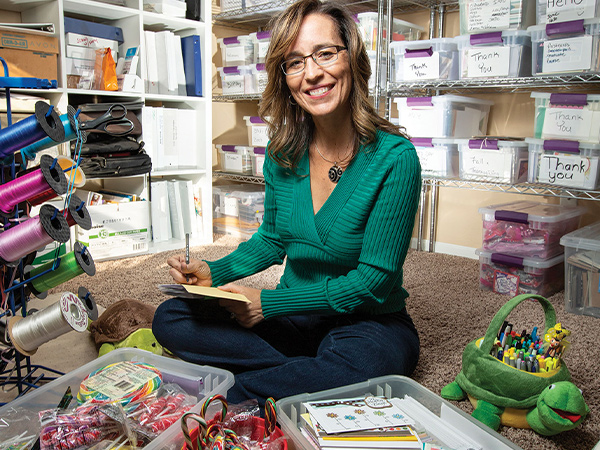A Family Confronts COVID and Cancer
For Rachel Orth and her family, the devastation of a diagnosis of metastatic stomach cancer was compounded by the COVID-19 pandemic.
Rachel Orth of Arlington, Texas, was diagnosed with stage 4 gastric cancer in November 2020 in the midst of the COVID-19 lockdowns.
Her initial oncology appointment, during which she learned her cancer was considered terminal, was conducted over a Zoom call. Very quickly, Rachel and her husband, Daniel, learned that her best hope for survival would be a clinical trial.
“I think cancer was probably the most isolating experience of my life,” Rachel said. “Going through that during the pandemic, which has been another very isolating experience, was traumatizing.”
Immediately after her diagnosis, Rachel, 33, her husband, and their children – aged 10, 7, and 4 – began to get counseling to cope with the psychosocial aspects of her diagnosis.
“However, because of COVID-19, that was all virtual, which was been difficult,” she said. “It was hard for my 10-year-old to open up and I think it being virtual has made it even harder on him. I had not seen my counselor face to face. One day on the phone she said, ‘I just really want to give you a hug and I’m sorry that I can’t because right now you’re dealing with a lot of grief and you’re doing it alone, which is hard.’”
When Rachel found a clinical trial at The University of Texas MD Anderson Cancer Center hundreds of miles away in Houston, she needed to undergo several procedures to qualify. Days before those appointments were scheduled, however, Daniel was diagnosed with COVID-19, delaying those critical procedures. Then Rachel developed symptoms and tested positive as well, further delaying the process.
“All told, it was about a month, which feels like a really long time when you’ve been given a really poor prognosis of months to a year to live,” she said.
After she was able to have the procedures, Rachel entered the phase I clinical trial of an investigational therapeutic. As a result, her disease has been stabilized.
Rachel shared her story in the AACR Report on the Impact of COVID-19 on Cancer Research and Patient Care. The report found:
- From January to July 2020, nearly 10 million people in the U.S. missed cancer screenings.
- Patients and cancer centers reported delays in cancer treatments including chemotherapy, immunotherapy, radiotherapy, and surgery.
- Racial and ethnic minorities and other medically underserved populations not only have shouldered a disproportionate burden of COVID-19, but also have been more affected by pandemic-related disruptions to the cancer care continuum.
The pandemic caused significant challenges for cancer researchers, including, research laboratory closures and clinical trial interruptions.
Learn more about the pandemic’s impact on patients and cancer research in the full AACR COVID and Cancer Report.

